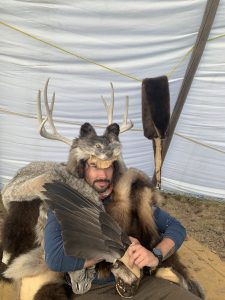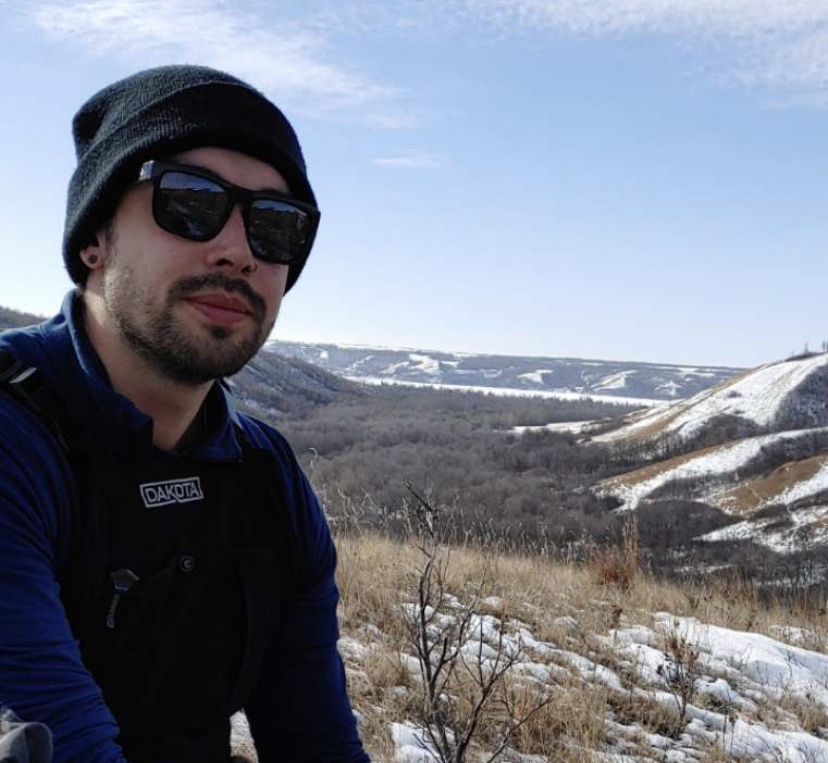
Raised in Indian Head, Garrick Schmidt (BEd ’20) spent his summers and spare time “out on the land” in the Qu’Appelle Valley at Katepwa and Lebret where his Métis family members originated. There Schmidt learned from family members how to hunt and trap and about some of the plants and medicines in the Valley.
In recent years he has added to that knowledge, as he says, “I have learnt from Elders, Knowledge Keepers and also from genetic memory. I know it might sound odd or strange. But for myself I find when I am on the land, I am making genetic connections to ancestors and they are passing down memory of how to do tasks and knowledge.”
Out of his desire “to help shape and guide younger Indigenous youth to give them the best possible chance to be successful,” Schmidt decided to attend the Saskatchewan Urban Native Teacher Education Program (SUNTEP) at the University of Regina.
As a family tradition, SUNTEP was an obvious choice: “My mother Patty-Lou Racette was a part of the first group of people to attend SUNTEP when it first became a program. … Being the third person in my immediate family and the second generation to graduate from the program makes it that much more special,” say Schmidt, who highly recommends SUNTEP for any Métis youth thinking about teaching because SUNTEP “gives Métis youth the opportunity to learn about family histories and continue to grow as individuals and professionals.”
Schmidt finished his BEd program in December 2019, and began teaching at Kakisiwew School on Ochapowace First Nation in January 2020. Even though a novice at teaching, Schmidt, with the support from his school administrator Riel Thomson and Director Nicole Bear, found opportunity to integrate land-based learning, taking his Grade 8 class out on the land.
“We are fortunate enough to have beautiful landscape right behind the school where we set up a trap line in the winter for rabbits,” Schmidt says.
Recently, due to the COVID-19 pandemic restrictions and students learning from home, Schmidt has been posting land-based learning videos on social media.
Schmidt says, “I felt during these times of chaos and panic that my students, community members, and beyond would benefit from seeing my videos, and the videos would give a sense of routine for my students. I also wanted to create these videos because it is so vital that our youth are taken back to the land to learn traditional skills where family members may not have had the opportunity to pass these on to their children, or where students are in an urban setting and unable to do so as well.”
Land-based learning, besides getting students and educators out of the classroom setting, has many benefits: “With class size issues, multiple intelligence learning, and also behavioral concerns, by taking students onto the land, teachers can see almost immediate changes in students. I have had the chance to design my own time-table where I have created a land-based class for my students. Making cross-curricular connections to every subject gives me accountability for teaching Saskatchewan curriculum as well as traditional teachings.”
Though the videos were intended for his students and the other students of Kakisiwew School, they have been viewed by many more. Schmidt says, “I know my videos have reached out to British Columbia, Ontario and I’m sure beyond. I am very excited to see where things go in the next few months.”
“I have received amazing feedback from my videos. I am hoping that things continue to rise and I am able to reach as many people as I possibly can. Land-based learning and traditional content can be hard to find at times and I feel that with the advances in technology and recording it makes it easier for me to reach a much larger audience,” says Schmidt.
On a personal level Schmidt says land-based learning feels like home: “It takes me home to the land, the Valley where I grew up. … I can’t believe I have only been teaching since January. It feels like I have been doing this for years now. I love the support from the Ochapowace Nation community; everyone has supported me since day one and welcomed me with open arms making it home for me.”
See LeaderPost story
Follow us on social media
